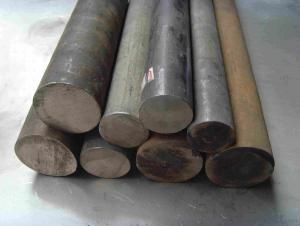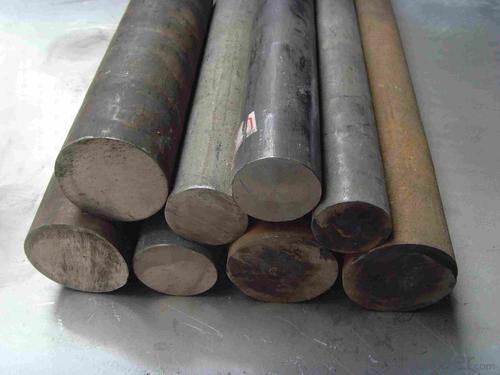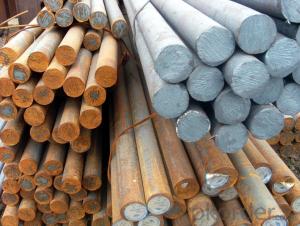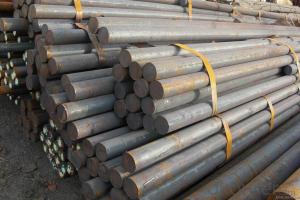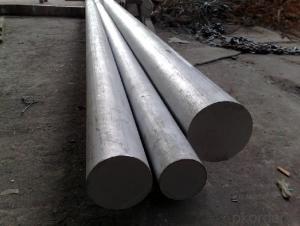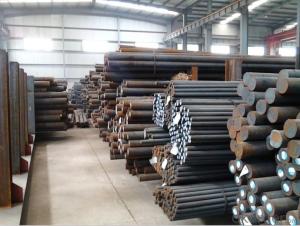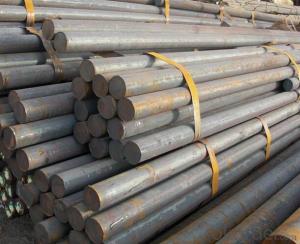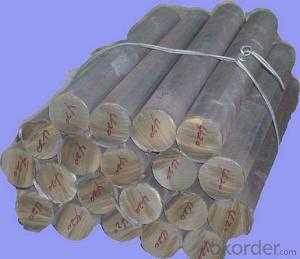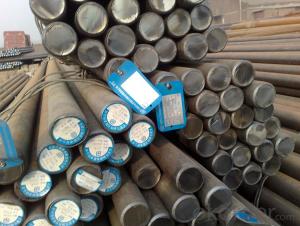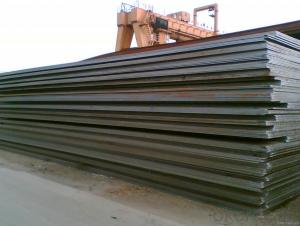Special Steel Tool Steel 1.2510 Material,SKS3 Material steel
- Loading Port:
- China main port
- Payment Terms:
- TT OR LC
- Min Order Qty:
- 30 m.t.
- Supply Capability:
- 10000 m.t./month
OKorder Service Pledge
OKorder Financial Service
You Might Also Like
Specification
Special Steel Tool Steel 1.2510 Material,SKS3 Material steel
Product information:
Specifications
-Delivery stock within 10 days
-ISO9001 certified factory
-Low price and high quality
-Flexible MOQ and payment
SKS3 mold steel
Diameter: 12-600mm
Length: 2000-4000mm
Surface condition of 1.2510 SKS3 mold steel
black/polished/machined/peeled/grinded/turned
Applications of 1.2510 SKS3 mold steel
1.2510 is used in cutting and punching toolsshear knives,thread rolling tools,measuring instruments platinum using molds.
| Chemical Composition(%) | |||||||
| C | Si | Mn | P | S | Cr | V | W |
| 0.85-1.00 | 0.10-0.50 | 1.00-1.40 | ≤0.030 | ≤0.030 | 0.40-0.60 | ≤0.30 | 0.40-0.60 |
| Specialty | |||||||
Refined steel of vacuum and take-off air, the quality of steel is pure; deliver products after anneal, steel products are easy to be cut and machined; the rigidity is high after quench, good endurance; the dimension is stable, small distortion. | |||||||
| Use | |||||||
| 1.All kinds of cutting tools, pressing mold, wood-FT mold, screw thread tools, plastic molds. | |||||||
| Heat Treatment | |||||||
| 1.To anneal after eliminate stress: 600-650°c | |||||||
| 2.Quench: 800-840 °c oil cooling | |||||||
| 3.Re- tempering: 180-200`C air cooling | |||||||
| Melting Process | |||||||
| 1. EAF: Electric Furnace+LF+VD(Optional) | |||||||
| 2. ESR: Electric Furnace+LF+VD+Eleroslag Remelted(Optional) | |||||||
| UT Class | |||||||
| According to Standard of SEP 1921/84,100% Volume, Level C/c, D/d or E/e | |||||||
| Tolerance on Quantity | |||||||
| +/-10% Per Size | |||||||
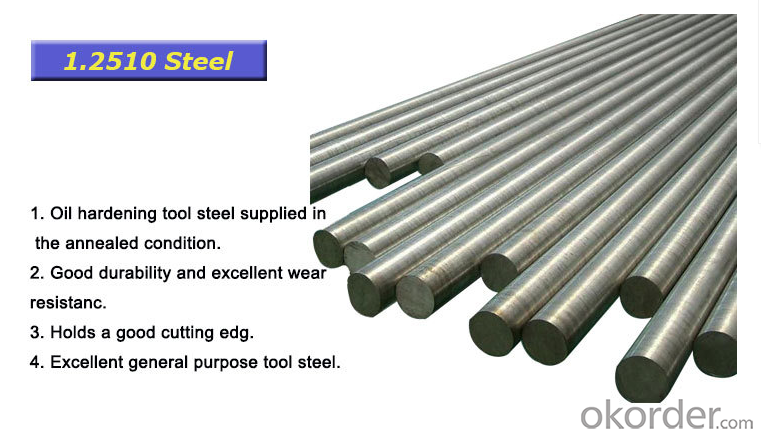
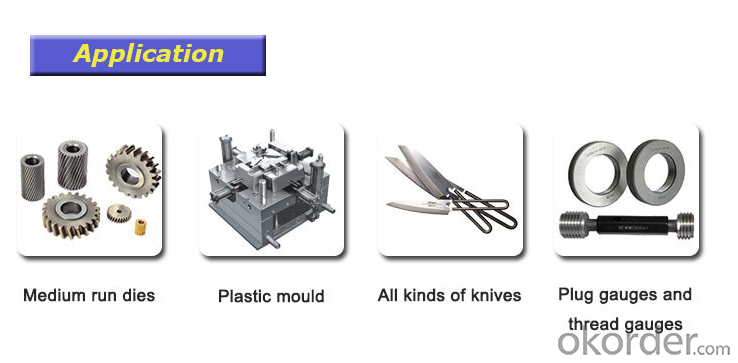
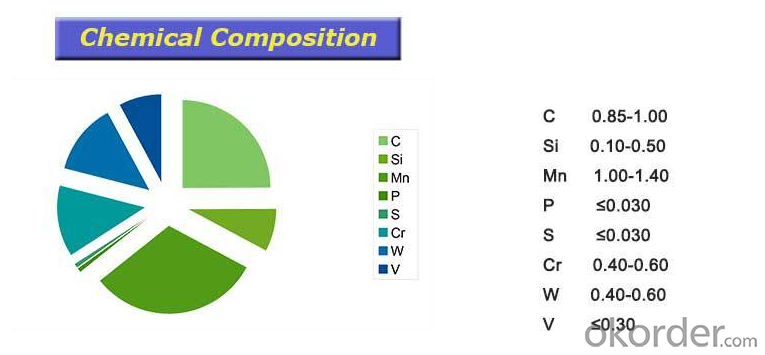
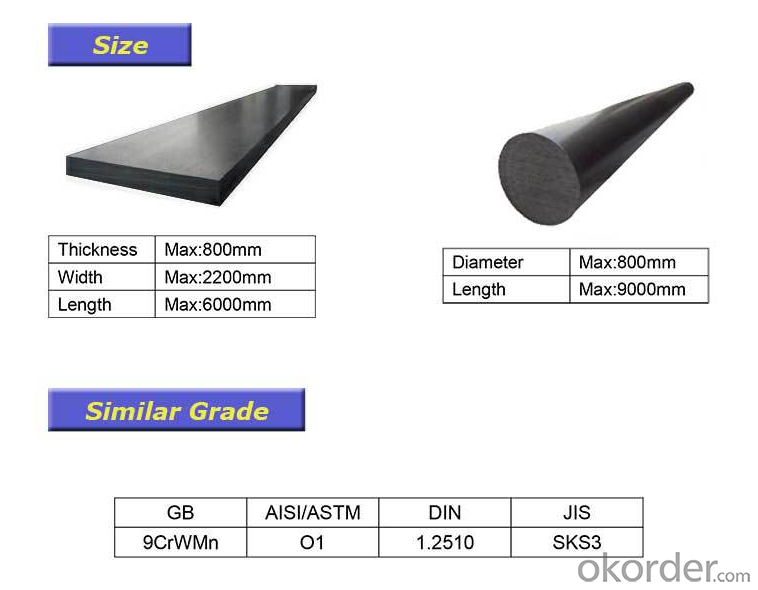
Other product show:
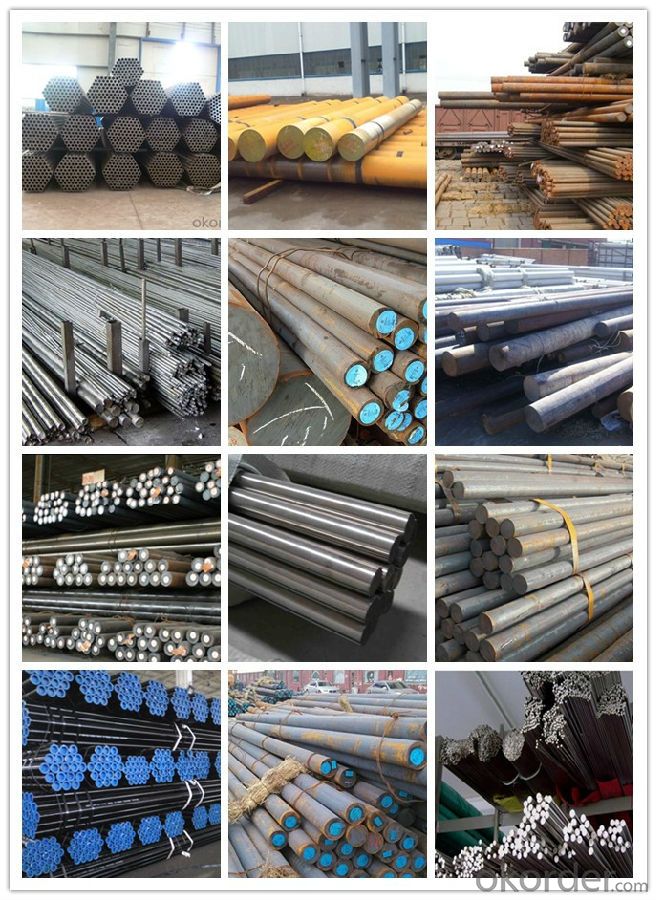
Our workshop show:
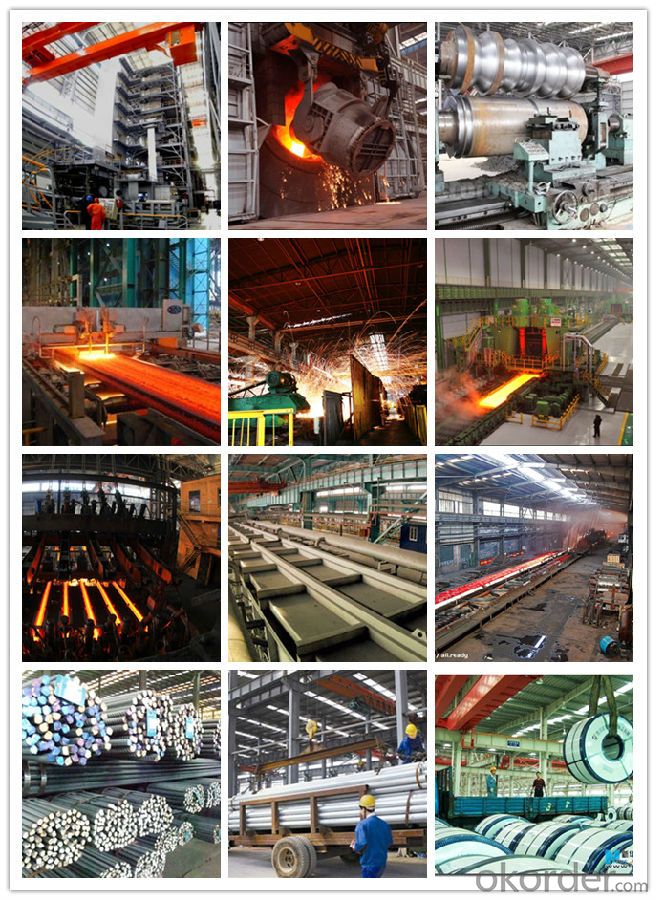
Our service:
-High manufacturing accuracy
-High strength
-Small inertia resistance
-Strong heat dissipation ability
-Good visual effect
-Reasonable price
Chose happens because of quality, then price, We can give you both.Additionally, we can also offer professional products inquiry, products knowledge train(for agents), smooth goods delivery, exellent customer solution proposals.Our service formula: good quality+good price+good service=customer's trust
SGS test is available, customer inspection before shipping is welcome, third party inspection is no problem.
If you need the sample, please feel free to let me know. Any question, we will contact you ASAP!
- Q: How is special steel used in the production of hydraulic components?
- Special steel is used in the production of hydraulic components due to its high strength, durability, and corrosion resistance properties. It allows for the manufacturing of hydraulic parts that can withstand high pressure, extreme temperatures, and harsh operating conditions. The use of special steel ensures the longevity and reliability of hydraulic components, making them suitable for various industries such as automotive, aerospace, and manufacturing.
- Q: What are the factors that affect the weldability of special steel?
- The factors that affect the weldability of special steel include composition, heat treatment, surface condition, joint design, welding process, and welding parameters.
- Q: How does special steel perform in extreme pressure conditions?
- Special steel is specifically designed to perform exceptionally well in extreme pressure conditions. Due to its unique composition and manufacturing process, special steel exhibits high strength, durability, and resistance to deformation, making it ideal for applications where extreme pressures are involved. When subjected to extreme pressure conditions, special steel is able to maintain its structural integrity without undergoing significant deformations. This is due to its high tensile strength, which enables it to withstand tremendous forces without breaking or bending. Additionally, the special steel's hardness and toughness allow it to resist wear and damage caused by the intense pressure. Furthermore, special steel possesses excellent heat resistance, which is crucial in extreme pressure conditions where elevated temperatures are often present. The steel's ability to withstand high temperatures without losing its mechanical properties ensures its reliability and effectiveness even under the most demanding circumstances. Moreover, special steel has excellent corrosion resistance properties, making it suitable for use in extreme pressure conditions where exposure to corrosive substances is a concern. The steel's resistance to oxidation and other chemical reactions prevents it from deteriorating or weakening, ensuring its long-term performance and reliability. Overall, special steel performs exceptionally well in extreme pressure conditions due to its high strength, durability, resistance to deformation, heat resistance, and corrosion resistance. These properties make it a reliable and efficient choice for various industries and applications that operate under extreme pressure environments, such as oil and gas exploration, aerospace, automotive, and heavy machinery manufacturing.
- Q: What are the different cryogenic grades of special steel?
- Specifically designed for use in extremely low temperature environments, there are several cryogenic grades of special steel available. These grades have been developed to retain their mechanical properties and prevent brittleness at cryogenic temperatures, making them ideal for applications such as LNG storage tanks, aerospace equipment, and low-temperature chemical processes. Among the commonly used cryogenic grades is the 300 series stainless steel, particularly types 304 and 316. These stainless steels contain nickel, which enhances their cryogenic toughness and ability to withstand thermal stress. Consequently, they are frequently employed in the construction of cryogenic storage vessels and piping systems. Another popular cryogenic grade is the 9% nickel steel, which is alloyed with approximately 9% nickel. This alloy provides excellent low-temperature toughness and ductility. As a result, it is often chosen for constructing LNG storage tanks, capable of withstanding the extremely cold temperatures required for the storage and transportation of liquefied natural gas. In addition, there are special low-temperature carbon steels, such as ASTM A350 LF2 and ASTM A333 Grade 6, which are engineered to maintain their toughness and impact resistance at cryogenic temperatures. These steels find extensive use in low-temperature applications, including cryogenic piping systems and equipment for the oil and gas industry. In conclusion, the various cryogenic grades of special steel encompass stainless steels (such as the 300 series stainless steel), 9% nickel steel, and low-temperature carbon steels (like ASTM A350 LF2 and ASTM A333 Grade 6). Each grade has been specifically designed to endure the challenges presented by extremely low temperatures while retaining their mechanical properties and resistance to brittleness.
- Q: How does special steel perform in corrosive environments?
- The purpose of special steel is to excel in corrosive environments. This is achieved by incorporating a greater amount of alloying elements, like chromium, which generates a safeguarding oxide layer on the steel's surface. By doing so, the steel is shielded from direct contact with the corrosive elements present in the environment. In addition, special steel may contain other alloying elements such as molybdenum, nickel, or copper, which further enhance its ability to resist corrosion. These elements contribute to the steel's capacity to withstand various types of corrosion, including pitting, crevice corrosion, and stress corrosion cracking, which are commonly observed in corrosive environments. Moreover, special steel often undergoes treatments with diverse surface coatings or finishes that offer additional defense against corrosion. These coatings encompass materials like zinc, epoxy, or polymers, which establish an extra barrier between the steel and the corrosive elements. To summarize, special steel delivers exceptional performance in corrosive environments due to its abundant alloying elements, protective oxide layer, and supplementary surface coatings. It provides remarkable resistance against different forms of corrosion and guarantees the durability and dependability of structures or equipment operating in such environments.
- Q: How is alloy steel different from carbon steel?
- Alloy steel is different from carbon steel because it is made by adding other elements to carbon steel, such as chromium, nickel, or manganese, to enhance its properties. This makes alloy steel stronger, more resistant to corrosion, and better suited for specific applications compared to carbon steel, which is primarily composed of iron and carbon.
- Q: How does special steel perform in high-temperature fatigue resistance?
- Special steel performs well in high-temperature fatigue resistance due to its unique composition and heat treatment processes. It has enhanced mechanical properties, such as high strength and toughness, which enable it to withstand repeated cyclic loading and resist deformation, even at elevated temperatures. Additionally, special steel exhibits excellent thermal stability, preventing the degradation of its microstructure and maintaining its mechanical properties over time. Overall, special steel is a reliable material choice for applications requiring high-temperature fatigue resistance.
- Q: How is wear-resistant steel used in mining equipment?
- Wear-resistant steel is commonly used in mining equipment to enhance their durability and longevity. It is specifically designed to withstand the harsh conditions and abrasive environments typically found in mining operations. Components such as buckets, blades, chutes, crushers, and screens are often made from wear-resistant steel to prevent excessive wear and damage caused by rocks, minerals, and other abrasive materials. This steel's high hardness and toughness properties ensure that the equipment can withstand the constant impact and abrasion, reducing maintenance needs and extending the equipment's lifespan.
- Q: What is the significance of alloying elements in special steel?
- Alloying elements play a crucial role in special steel as they enhance the mechanical properties, corrosion resistance, and overall performance of the steel. These elements are added in specific proportions to alter the microstructure and create desired properties such as increased strength, hardness, toughness, and heat resistance. Additionally, alloying elements can improve the steel's ability to withstand extreme conditions, such as high temperatures or corrosive environments. Overall, the presence of alloying elements in special steel allows for the production of tailor-made materials that meet specific application requirements in industries such as automotive, aerospace, and construction.
- Q: What are the safety considerations when working with special steel?
- When working with special steel, there are several important safety considerations to keep in mind. Firstly, it is crucial to wear appropriate personal protective equipment (PPE) such as safety glasses, gloves, and protective clothing to prevent any potential injury. Special steel may have sharp edges or contain hazardous materials, so precautions should be taken to avoid cuts or exposure to harmful substances. Additionally, special steel may require specific handling techniques due to its weight or complexity. It is important to follow proper lifting and handling procedures to prevent strains or accidents. Furthermore, working with special steel often involves the use of heavy machinery or tools, so operators must be trained and qualified to operate such equipment safely. Another safety consideration is the potential for fire or explosion. Depending on the type of special steel, it may have specific flammability properties, and appropriate fire prevention measures should be implemented. This includes having fire extinguishers readily available and ensuring a safe working environment free from any potential ignition sources. Lastly, proper ventilation is crucial when working with special steel, as certain processes may release harmful fumes or gases. Adequate airflow and ventilation systems should be in place to minimize the risk of respiratory issues or chemical exposure. By considering these safety measures, workers can mitigate potential hazards and create a safer working environment when dealing with special steel.
Send your message to us
Special Steel Tool Steel 1.2510 Material,SKS3 Material steel
- Loading Port:
- China main port
- Payment Terms:
- TT OR LC
- Min Order Qty:
- 30 m.t.
- Supply Capability:
- 10000 m.t./month
OKorder Service Pledge
OKorder Financial Service
Similar products
Hot products
Hot Searches
Related keywords
